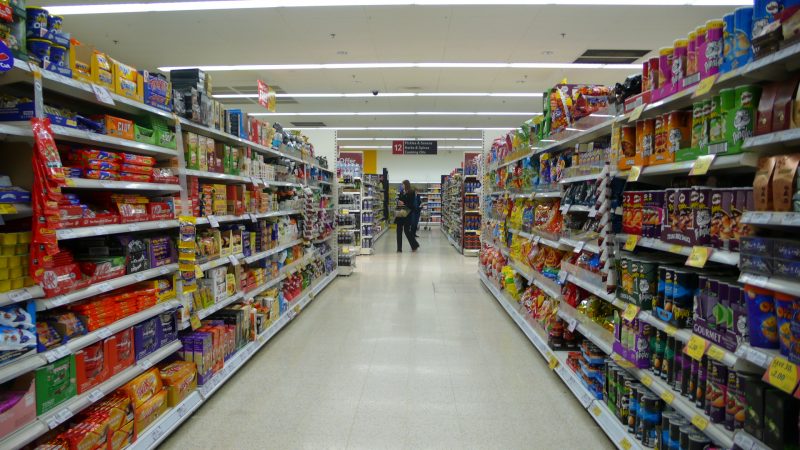As inflation continues to rip through family budgets, and consumers are forced to pay sky-high food prices, the government has come under fresh pressure to crackdown on supermarkets.

In March 2023, the inflation rate for food and non-alcoholic beverages rose to 19.2 percent, according to Office for National Statistics. This is the fastest rate food inflation has risen in 45 years. ONS figures also show that more than half (51 percent) of adults in the UK are worried about the price of food.
Analysis of official figures by the Lib Dems, shows that customers face higher prices in supermarkets, despite wholesale costs having fallen. For example, a loaf of wholemeal bread has risen by 26 percent, even though the cost of breadmaking wheat has fallen by 14 percent. Similarly, the price of tomatoes has soared by 13 percent despite farmers having dropped prices by 7 percent.
Separate figures from Which? show that meat, yoghurt and vegetables doubled in price in the year to March.
As inflation continues to rip through family budgets, and consumers are forced to pay sky-high food prices, the government has come under fresh pressure to crackdown on supermarkets. This week, farmers, supermarket bosses, food manufacturers and consumer group representatives gathered at 10 Downing Street to discuss Britain’s food security. But what the reasons behind the UK’s crippling food inflation?
Brexit
Additional checks and requirements on products being imported to Britain has increased food prices by 6 percent overall, says the Centre for Economic Performance (CEP). Analysis by the CEP at the London School of Economics said that Brexit added £210 to household food bills across the 24 months to the end of 2021. The CEP also found that rising costs have likely hit those on lower incomes the hardest, because a greater share of their pay packets are spent on food.
The Food and Drink Federation confirms that Brexit has aided food inflation, saying Britain’s exit from Europe has “made the situation worse for UK manufacturers” and has added hundreds of pounds to the average UK household shopping bill.
“We believe the summit must address costly and heavy-handed regulation, post-Brexit labelling requirements, skills shortages and the complexity of border checks, all of which are pushing up costs when food price inflation is at a record high,” said Karen Betts, chief executive of the Food and Drink Federation.
Meanwhile, National Farmers Union (NFU) president Minette Bridget Batters, says that while the UK was still in the European Union, it was the “preferred country to work in” for seasonal labour, but now we’re out and freedom of movement has ended, the lack of EU workers has been a “huge, huge issue.”
Climate change and poor harvests
Poor harvest in Europe and North Africa earlier in the year meant that wholesalers and retailers have had to pay more for items like fruit, vegetables and sugar, which have been in short supply. This year’s poor harvests have been linked to climate change. Dr Peter Alexander, senior lecturer in food security at the University of Edinburgh, says that climate change and extreme weather events becoming “more frequent and extreme” is impacting food production.
“Overall, this has suppressed the rate of increases in agricultural productivity, and potentially lead to greater market price volatility, as well as higher prices,” said Dr Alexander.
‘Greedflation’
Warnings have been made that large corporations have fuelled inflation with price increases extending the cost of raw materials. Analysis by Unite the union shows that supermarkets, food manufacturers and shipping companies are among hundreds of large companies who have witnessed improved profits and protected shareholder dividends, while the cost of living crisis continued to batter household budgets.
“Profiteering is a reflection of Britain’s broken economy. From price gouging to state-licensed monopolies in energy and utilities, the choices made by corporations are revealed to have caused historic ‘price spiralling’ – and governments are letting them do it,” said Unite.
War in Ukraine
Russia’s invasion of Ukraine has resulted in a huge decline in the supply of major food stables, which, in turn, has led to a rise of food prices globally. In cutting off supplies from the world’s biggest exporter of sunflower oil, the war has meant the cost of alternatives have also climbed. Being a major producer of cereals, such as wheat and maize, the conflict has meant the price of these products have also risen sharply.
Gabrielle Pickard-Whitehead is a contributing editor to Left Foot Forward
Left Foot Forward doesn't have the backing of big business or billionaires. We rely on the kind and generous support of ordinary people like you.
You can support hard-hitting journalism that holds the right to account, provides a forum for debate among progressives, and covers the stories the rest of the media ignore. Donate today.



